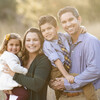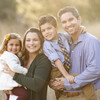Courage is the most important of all the virtues, because without courage you can't practice any other virtue consistently. — Maya Angelou
Recently during our family devotional time, I read a fascinating story to my kids from Arthur Maxwell’s, The Bible Story. It is based on 2 Chronicles 28. The story speaks of courage and forgiveness, but I had forgotten the details. So I went back to the text and examined it more closely.
I discovered that the story took place during the time when Israel and Judah were split.
2 Chronicles 28:7–11 says: “The men of Israel took captive from their fellow Israelites who were from Judah two hundred thousand wives, sons and daughters. They also took a great deal of plunder, which they carried back to Samaria."
But a prophet of the Lord named Oded was there and he went out to meet the army when it returned to Samaria. He said to them, "Because the Lord, the God of your ancestors, was angry with Judah, he gave them into your hand. But you have slaughtered them in a rage that reaches to heaven. And now you intend to make the men and women of Judah and Jerusalem your slaves. But aren’t you also guilty of sins against the Lord your God? Now listen to me! Send back your fellow Israelites you have taken as prisoners, for the Lord’s fierce anger rests on you.”
In the story, Oded confronts a vast number of people returning from war. He confronts the victorious army to chastise them. They army could have tried to silence or overpower him, but Oded spoke up with courage anyway.
Listen to what the text says next in verses 12-13. “Then some of the leaders in Ephraim — Azariah son of Jehohanan, Berekiah son of Meshillemoth, Jehizkiah son of Shallum, and Amasa son of Hadlai—confronted those who were arriving from the war. 'You must not bring those prisoners here,' they said, 'or we will be guilty before the Lord. Do you intend to add to our sin and guilt? For our guilt is already great, and His fierce anger rests on Israel.”
These four men spoke up and confronted an army. They put their lives at risk in support of the truth and in support of the prophet. This took courage, leadership and conviction. They could have been overpowered by the army. Sometimes that happens. Sometimes speaking up with courage gets people killed. But sometimes, God can transform courage and conviction into a beautiful thing.
In verses 14-15 we see what happened next. “So the soldiers gave up the prisoners and plunder in the presence of the officials and all the assembly. The men designated by name took the prisoners and from the plunder they clothed all who were naked. They provided them with clothes and sandals, food and drink, and healing balm. All those who were weak they put on donkeys. So, they took them back to their fellow Israelites at Jericho, the City of Palms and returned to Samaria.”
When we are willing to tell the truth and listen to the truth, beautiful things can happen. In this case Judah and Israel were momentarily united. But there can be no reconciliation without first telling the truth.
Sometimes we like to fast forward to the forgiveness part and sweep everything under the rug, but that’s not how healing happens. In this story, Oded spoke clearly about the harm that was done and the people responded with repentance.
Peter Bromberg said, "When we avoid difficult conversations, we trade short term discomfort for long term dysfunction."
Telling the truth is not always easy. Sometimes it means confronting your own tribe, challenging a cherished paradigm, or as in the case of Oded the prophet and the four men, confronting an entire army.
As the Bible says, "The truth will set you free," but first it will make you uncomfortable. Don’t be afraid of feeling uncomfortable. Take risks. Be courageous. Allow the truth to set you free.









